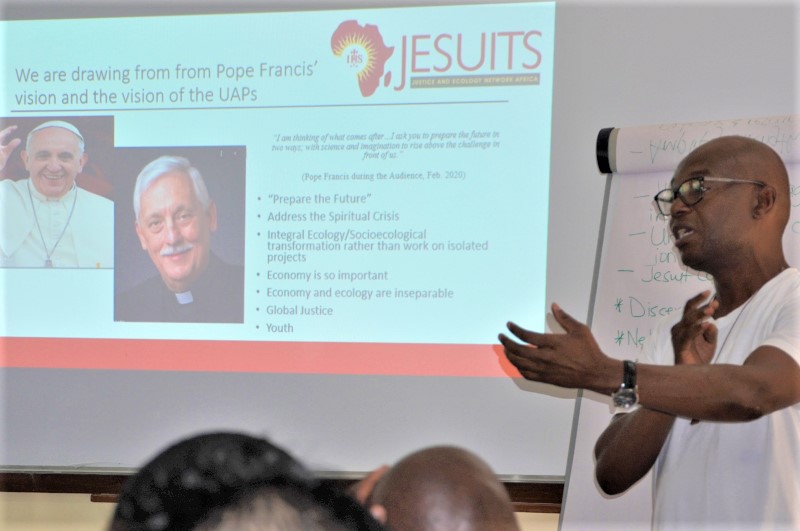

CAPE TOWN, South Africa – At the heart of the G20 Interfaith Forum, a clear and urgent message emerged from Fr. Charles Chilufya, S.J., a key voice in the dialogue on global finance: the world’s economic architecture is failing its most vulnerable people, and the G20 has a moral responsibility to lead its overhaul.
Fr. Chilufya, the former Director of the Justice and Ecology Office of the Jesuit Conference of Africa and Madagascar, participated in a core plenary session titled “Action Imperatives and Realities of Finance and Debt,” where he directly linked Africa’s most pressing crises to systemic injustices in the global financial system.
The plenary, which set the stage for the forum held from August 10-14, 2025, focused on delivering interfaith recommendations to the G20, emphasizing that priorities like food security, climate finance, and migration are inextricably tied to issues of debt and financial sustainability.
A Stark Picture: Debt Payments Over Medicine
Drawing from his frontline experience, Fr. Chilufya presented a stark contrast to illustrate the human cost of the current system. He cited the case of Kenya, where he worked for 8 years: the government allocated a staggering $10 billion USD for external debt servicing in a single year.
“What was left for health?” he asked the audience. “$800 million USD—just 3% of the budget.” He argued that this forced transfer of wealth directly results in preventable suffering: mothers dying in childbirth, children without vaccines, and teachers and health workers going unpaid.
“The first rule we need to change… is that no country should be forced to export billions, leaving its own people without medicine,” Fr. Chilufya stated, framing the issue not as an economic abstraction but a life-or-death emergency.
From Glenagles to a New "Ubuntu Moment"
Fr. Chilufya recalled the historic 2005 G8 Summit in Glenagles, where world leaders, pressured by the global Jubilee movement, agreed to significant multilateral debt relief for poor nations. He called for a new “Glenagles moment,” infused with the African principle of Ubuntu (“I am because we are”), where G20 leaders come together in a spirit of relational solidarity.
“We need that Ubuntu to come back so that we create another Glenagles moment... It is possible when leaders come together,” he said, emphasizing that the solutions are known but require political will.
He outlined a multi-pronged approach for the G20’s agenda:
1. Debt Justice: Implementing comprehensive restructuring and cancellation for nations spending more on debt than on human development.
2. Tax Justice: Cracking down on the estimated $88 billion USD that annually leaves Africa through tax evasion and avoidance, funds that could eradicate poverty.
3. Long-Term Financing: Shifting from short-term, high-interest loans to long-term financing for climate adaptation, health, and education.
Aligning with Jubilee 2025 and South Africa’s G20 Themes
Fr. Chilufya’s arguments dovetailed perfectly with the forum’s broader themes, particularly the call to action for Jubilee Year 2025 and South Africa’s G20 presidency agenda focused on solidarity, equality, and sustainability.
His vision aligns with the ethical framework presented by others at the forum including those by the new Director of Jesuit Justice and Ecology Network (JENA), Fr. Rampe Hlobo, SJ who argued for a financial system built on equity—correcting historical imbalances—rather than a false neutrality that perpetuates inequality.
By highlighting the direct line between a loan agreement in New York or London and a child’s death in a rural clinic, Fr. Chilufya made an impassioned case that finance is a deeply moral issue. He charged the G20, faith institutions, and civil society to work together to build a system that serves people, not capital.
“Pope Francis called this a spiritual crisis,” Fr. Chilufya concluded. “We need to heal from that crisis and do what we can... and provide solutions.” His participation underscored a central message of the forum: that faith leaders will be at the forefront of holding global powers accountable for building an economy of Ubuntu.
Related Articles








Select Payment Method
Pay by bank transfer
If you wish to make a donation by direct bank transfer please contact Fr Paul Hamill SJ treasurer@jesuits.africa. Fr Paul will get in touch with you about the best method of transfer for you and share account details with you. Donations can be one-off gifts or of any frequency; for example, you might wish to become a regular monthly donor of small amounts; that sort of reliable income can allow for very welcome forward planning in the development of the Society’s works in Africa and Madagascar.
Often it is easier to send a donation to an office within your own country and Fr Paul can advise on how that might be done. In some countries this kind of giving can also be recognised for tax relief and the necessary receipts will be issued.




